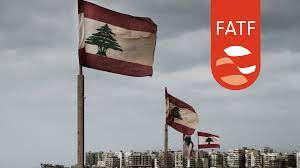Lebanon has officially been placed on the Financial Action Task Force (FATF) Gray List, a significant blow to its international financial standing. This decision highlights the country’s ongoing struggle with corruption, inadequate judicial oversight, and concerns over terrorist financing.
One of the primary reasons for Lebanon’s gray-listing is persistent corruption within the government, as exemplified by U.S. Treasury sanctions placed on key policy makers like Gebran Bassil and Ali Hassan Khalil and large government contractors like Dany Khoury and Jihad al-Arab. These individuals, tied to government contractors, have been implicated in illicit activities. LIMS argued that Lebanon’s failure to promote genuine competition in public contracts (often favoring single bidders and circumventing proper procurement processes) has contributed to the country’s gray-list status. A competitive bidding process would help reduce the allocation of contracts to nefarious actors and restore credibility to Lebanon’s financial system.
The country’s judiciary and terrorism financing remain a critical area of concern. Lebanon’s Central Bank and the banking sector have made significant strides toward compliance with FATF standards. However, the broader economy—particularly the cash economy, which accounts for more than 50% of Lebanon’s GDP—remains largely unregulated. This lack of oversight enables substantial money laundering and illicit financial flows to persist.
A critical challenge lies in addressing sources of terrorist financing within the country, which have been a longstanding concern for the FATF. The financing of such activities, often facilitated through certain entities, undermines Lebanon’s commitments to combating money laundering and terrorist financing. Although these issues are frequently minimized domestically, they remain a key factor in FATF’s decision to gray-list Lebanon.
LIMS cautioned that gray-listing is likely to have counterproductive effects in the fight against terrorism financing. The increased restrictions on international financial transactions will limit the ability of Lebanon’s compliant banks to access the international banking system making it more difficult for legitimate businesses to operate. In parallel, the intended targets of these sanctions have developed para-financial institutions and regional networks, relying on a cash-based (hawala-style) system that remains largely unaffected.
The government’s continued inaction in addressing systemic corruption and the cash economy has placed Lebanon in an increasingly precarious position. Without swift reforms, the country risks deeper economic isolation and an even more challenging path to recovery.
- Electricity Losses Are Worsening, So What About Supply? And What Is The Impact Of Not Collecting Revenue On Fuel Purchase Earnings? October 30, 2024: VDL, Video Interview AR
- Electricity In Times Of War: Losses Due To Deliberate Neglect! October 29, 2024: Aliwaa, Article AR
- Electricity And Water Shortages In Displacement Centers: Generators Benefit In Peace And War, October 21, 2024: Al Modon, Article AR
- Turning The Crisis Into An Opportunity To Enhance Solar Energy! October 16, 2024: Al Hiwar News, Article AR

